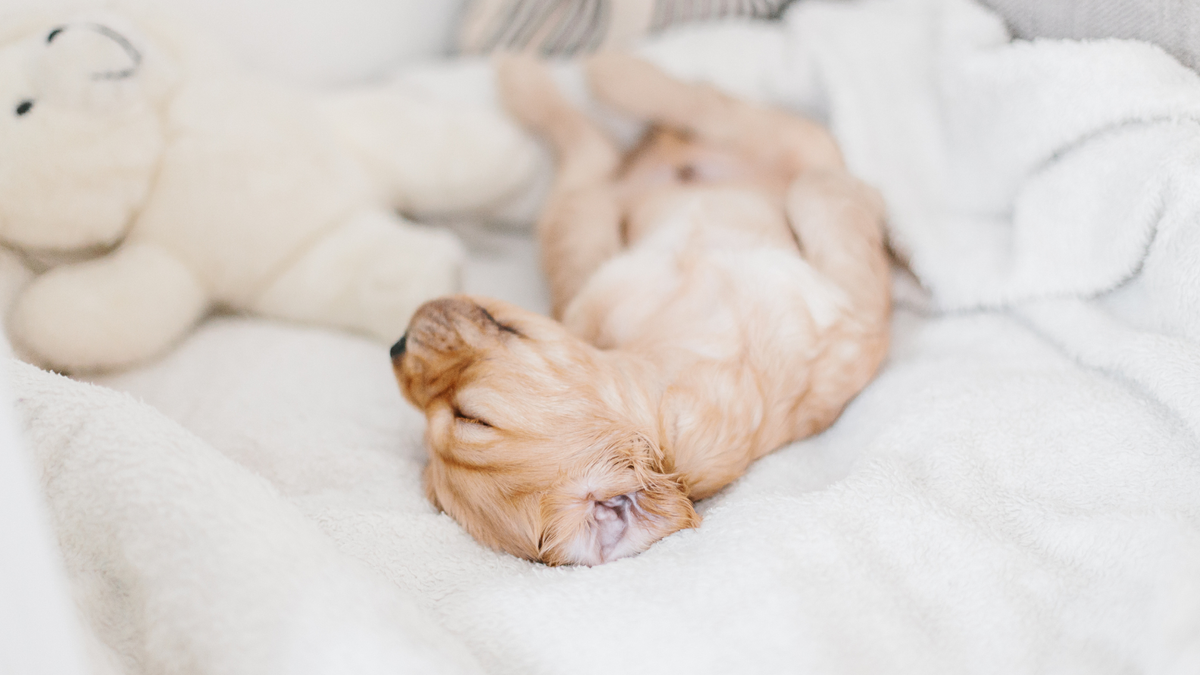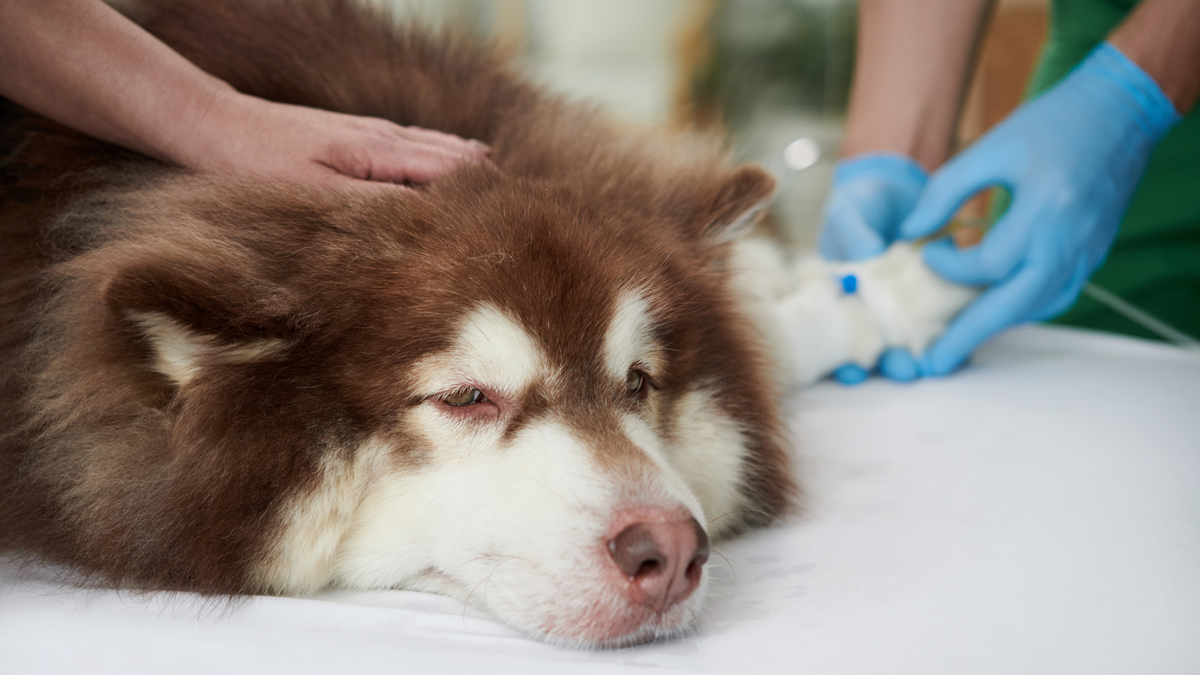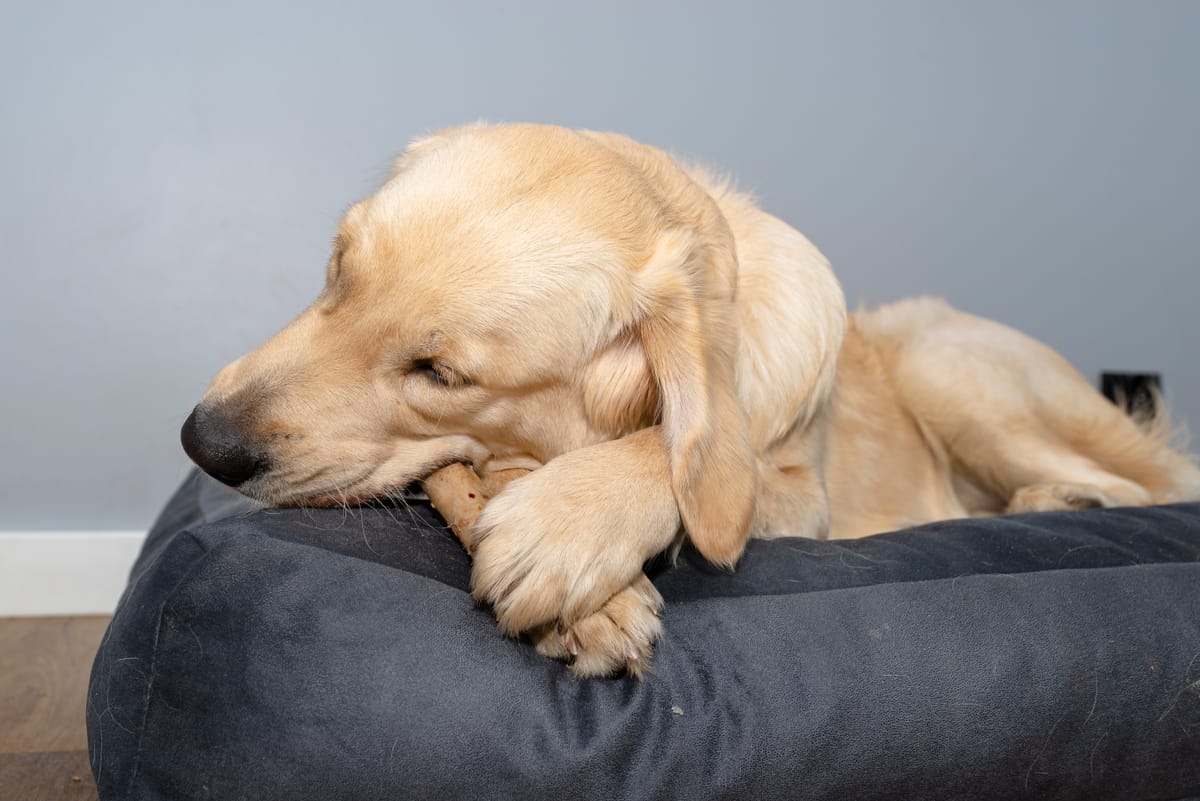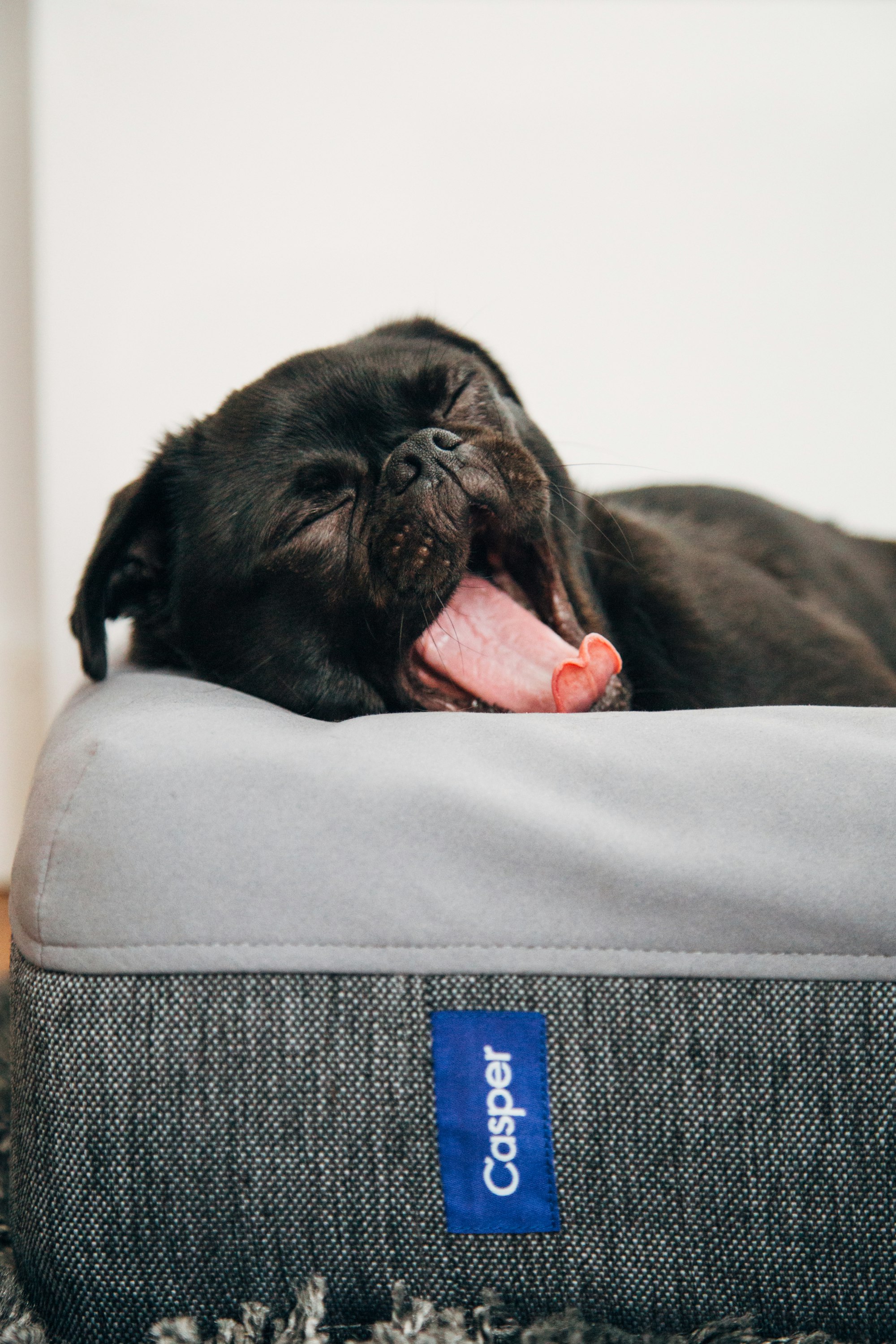Welcoming a new puppy into your home is an exciting adventure, but the challenge of getting them to sleep through the night can sometimes feel like an uphill battle. As any pet owner will attest, a good night's sleep for your furry friend is essential for their health and your sanity. In this guide, we'll explore effective strategies to ensure your puppy gets the rest they need, allowing both of you to wake up refreshed and ready for a day of play and bonding.

Understanding Puppy Sleep Patterns
Hey there, new pup parent! Getting your furry friend to sleep through the night starts with understanding their sleep patterns. Think of it like deciphering a secret code, but way more adorable.
Puppies, much like tiny humans, need more sleep than their grown-up counterparts. You'll notice they snooze a lot during the day, and that's completely normal. As your pup grows, their sleep patterns change. It's like they're leveling up in the sleep game.
So, when your little ball of fur is in the snoozing zone, let them be. Respect the nap time, and you'll find it easier to tackle the night-time sleep puzzle.

Creating a Comfortable Sleeping Environment
Now, let's talk about creating a haven for your pup's beauty sleep. Choosing the right bed and bedding is like picking out the perfect mattress for yourself. It's all about comfort.
Opt for a cozy bed that gives your pup enough space to stretch out. Think Goldilocks style – not too big, not too small, just right. And don't forget the bedding. Something soft and snuggly will make them feel like they're sleeping on a cloud.
Consider the temperature and lighting too. Dogs are all about ambiance. Make sure the room is comfortably cool, and if your pup is afraid of the dark, a nightlight might be the perfect solution.
Establishing a Bedtime Routine
Now, onto the importance of routines – dogs thrive on them, just like kids (and let's be real, adults too). Establishing a bedtime routine is like telling your pup, "Hey, it's time to wind down, buddy."
Start with a calming pre-sleep ritual. A short walk, some gentle play, or even a soothing brush can do the trick. It's like a canine spa treatment before bedtime.
Consistency is the magic word here. Dogs love knowing what to expect. So, if you're consistent with your bedtime routine, your pup will catch on and start associating those activities with the cue to hit the hay.
Feeding Schedule and Nighttime Snacks
Alright, let's dive into the world of puppy dining and midnight munchies. Just like us, what your pup eats and when can impact their sleep, so let's get that feeding schedule on point.
Start by setting regular meal times. Dogs are creatures of habit, and having a consistent feeding schedule helps regulate their biological clock. It also minimizes the chance of a 2 a.m. "I'm hungry" wake-up call.
Now, let's talk about nighttime snacks. Who doesn't love a little midnight snack, right? Well, your pup certainly does. But choose wisely! Opt for snacks that are easy on the tummy and won't cause a late-night digestive party.
Consider a small, light snack about an hour before bedtime. It can be the doggy equivalent of a warm glass of milk – soothing and satisfying without overloading their system. And trust me, a content pup equals a quieter night.
Regular Exercise for Better Sleep
Time to lace up those imaginary sneakers and hit the pavement with your pup! Regular exercise isn't just for us humans; it's a game-changer for your furry friend's sleep too.
Imagine your pup's energy as a bottle of soda – exercise is like popping the cap and letting out the fizz. Without it, you've got a potential explosion on your hands. So, incorporate daily walks, playtime, and maybe even a game of fetch into your routine.
The goal here is to tire them out in the best way possible. A tired pup is a happy pup, and a happy pup sleeps like a log. It's a win-win situation. Plus, the extra bonding time is a fantastic bonus.
Positive Reinforcement for Nighttime Behavior
Let's talk doggy psychology for a minute. Dogs, much like humans, respond well to positive reinforcement. So, when it comes to nighttime behavior, catch them being good!
If your pup stays calm and collected during the night, give them a virtual high-five. Positive words, gentle pats, or even a small treat can work wonders. Dogs are quick learners, and associating good behavior with positive outcomes makes them more likely to repeat it.
Avoid unintentionally reinforcing bad habits. If your pup wakes you up with a bark or a whimper, don't reward that behavior. Instead, wait for a moment of quiet and then shower them with praise. It's all about teaching them that nighttime is for snoozing, not serenading the moon.
Dealing with Nighttime Disturbances
Alright, night owls, let's tackle those pesky nighttime disturbances that can turn your cozy home into a canine carnival. Whether it's the midnight howls or the incessant excessive barking, we've got some tricks up our sleeves.
First things first, avoid making a fuss when your pup kicks off the nighttime concert. It's tough, I know, but responding with attention might unintentionally encourage the behavior. Instead, try a subtle approach. Wait for a moment of calm, then reward with a soothing voice or a gentle pat.
If your pup is a serial whiner, it's time to play detective. Is it hunger, boredom, or just a desire to be closer to you? Addressing the root cause helps you develop a game plan to keep those disturbances in check. Remember, patience is your secret weapon here.

Understanding Separation Anxiety
Now, let's talk about the big 'A' word – separation anxiety. It's like FOMO for your furry friend, and it can be a real sleep disruptor. Recognizing the signs is crucial. Does your pup get anxious when you grab your keys? Lose their marbles when you're about to leave?
Start by practicing short periods of separation during the day. Leave the house for a few minutes, then gradually increase the time. This helps your pup build confidence and understand that you always come back. It's like puppy therapy, and it works wonders.
Create a positive association with departures by giving your pup a special treat or a favorite toy when you leave. Make leaving and returning low-key, so it becomes a routine rather than a dramatic event. Slowly but surely, you'll take the 'anxiety' out of separation anxiety.
Health Check: Consulting the Veterinarian
If you've tried everything and your pup still seems like a canine insomniac, it's time for a health check. Consulting the veterinarian is like getting a second opinion from a sleep specialist.
Puppies, like humans, can be affected by health issues that mess with their sleep. Whether it's a tummy ache, discomfort, or an underlying condition, your vet can help pinpoint the problem.
Discuss your pup's sleep habits, diet, and any behavioral changes you've noticed. A thorough checkup ensures you're not missing any red flags, and it gives you peace of mind knowing you're taking a holistic approach to your pup's well-being.
Introducing Sleep Training Techniques
Alright, sleepyheads, it's time to talk about the nitty-gritty of getting your pup to snooze like a pro. Introducing sleep training techniques – think of it as the puppy version of bedtime boot camp.
Start with crate training. It's not a doggy jail, I promise! A cozy crate becomes your pup's safe space, and it helps establish a sleep routine. Make it comfy with their favorite blanket and toys, so they associate it with good vibes.
Consistency is key here. Use the same command or phrase when it's bedtime. Whether it's "bedtime" or "snooze time," be clear and stick to it. Dogs are smart, but they need us to be consistent teachers.
Now, the tough part – the 'cry it out' method. I know, it sounds harsh, but sometimes a bit of tough love goes a long way. When your pup whines or barks, resist the urge to rush to the rescue immediately. Give them a chance to self-soothe. It's like teaching them to fall asleep on their own, and trust me, they'll thank you for it later.
Avoiding Common Mistakes
We all make mistakes, right? But let's try to skip the puppy sleep blunders. One common boo-boo is letting your pup dictate the terms. If they start playing the "I'm cute, so let me stay up" card, resist! Stick to the routine, and soon they'll realize bedtime isn't negotiable.
Another pitfall is inconsistency. Changing up the rules confuses your pup. If sometimes they're allowed on the bed and other times they're not, it's like sending mixed signals. Be clear about the rules from day one, and you'll avoid unnecessary bedtime drama.
And here's a biggie – reacting to every little whimper. It's tempting, I get it, but constant attention reinforces that whining gets results. Stay strong, and remember, a bit of short-term discomfort can lead to long-term sleep success.
The Importance of Patience

Now, let's talk about the unsung hero of puppy training – patience. Rome wasn't built in a day, and your pup won't become a sleep superstar overnight. It takes time, consistency, and a sprinkle of that magical ingredient called patience.
Set realistic expectations. Your pup won't transform into a sleep wizard on day one. Celebrate small victories – a night with fewer disturbances, a quicker bedtime routine. It's all progress.
When your pup tests your patience with a midnight howl or an early wake-up call, take a deep breath. Losing your cool won't help. Remember, you're a team, and success is a journey, not a destination.
Monitoring and Adjusting the Sleep Routine
Alright, sleep champions, we're in the homestretch. Once you've laid the groundwork for your pup's sleep routine, it's time to put on your detective hat and do a bit of monitoring and adjusting. Think of it as fine-tuning for the ultimate sleep symphony.
Start by keeping tabs on your pup's sleep patterns. Are they gradually sleeping longer through the night? Any changes in behavior? Think of yourself as a sleep scientist, observing the experiment – your pup's nightly slumber.
If you notice any disruptions, don't panic. It's normal for adjustments to be needed. Maybe your pup's afternoon nap is affecting their nighttime sleep, or perhaps they need a bit more playtime during the day. It's all part of the puzzle.
Now, be flexible and ready to make adjustments. If your initial bedtime routine isn't doing the trick, tweak it a bit. Maybe add a calming activity or adjust the timing of your evening walk. Like any good recipe, a bit of experimentation can lead to the perfect blend for your pup.
And remember, Rome wasn't built in a day, and neither is a flawless sleep routine. Celebrate progress, no matter how small. If your pup sleeps an extra hour or has a night with fewer disturbances, give yourself a pat on the back – and maybe a treat for your furry friend.
So, there you have it – monitoring and adjusting the sleep routine is the final act in the epic tale of getting your pup to sleep like a rockstar. Stay vigilant, stay flexible, and soon you'll both be enjoying peaceful nights and energized mornings. 🌙🐶💤

Conclusion
In conclusion, helping your puppy sleep through the night is a rewarding journey that strengthens the bond between you and your furry friend. By understanding their unique sleep patterns, creating a comfortable environment, and implementing consistent routines, you pave the way for restful nights and joyful days.
Frequently Asked Questions (FAQs)
- Q1: How long does it take for a puppy to adjust to a new sleep routine?
A: The adjustment period varies, but with consistency, most puppies adapt within a few weeks.
- Q2: Can I use a white noise machine to help my puppy sleep?
A: Yes, white noise can be soothing for puppies. Experiment with different sounds to find what works best.
- Q3: Should I wake my puppy up at the same time every morning?
A: Establishing a consistent wake-up time helps regulate your puppy's overall sleep schedule.
- Q4: Is it okay to let my puppy sleep in bed with me?
A: While some owners choose this, it's essential to establish boundaries early to avoid future issues.
- Q5: What if my puppy's sleep disturbances persist despite following these tips.
A: Consult your veterinarian to rule out any underlying health issues and get personalized advice.
More articles on Dogs and Sleep:






